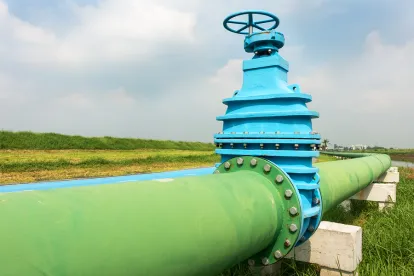PHMSA issues guidance in response to the Coronavirus (COVID-19) Outbreak. Status of PHMSA Rulemakings. PHMSA requests comments on proposed revisions to the hazardous liquid pipeline accident report form and instructions. PHMSA and TSA announce updated pipeline security agreement. Department of Transportation issues compliance notice regarding use of Cannabidiol (CBD) products.
PHMSA Issues Guidance In Response to the Coronavirus (COVID-19) Outbreak
On March 20, the Pipeline and Hazardous Materials Safety Administration (PHMSA) issued a Notice of Stay of Enforcement and Notice of Enforcement Discretion to Operators Affected by the Coronavirus (COVID-19) Outbreak (Notice). The Notice is addressed to operators of gas pipelines, hazardous liquid pipelines, and liquefied natural gas (LNG) facilities and applies to operators faced with limited resources as a result of the President’s March 13 Declaration of a National Emergency Relating to the Novel Coronavirus Disease Outbreak (National Emergency). The Notice is effective immediately until further notice or modification by PHMSA.
In addition, on March 19, PHMSA issued Guidance to State Partners Regarding COVID-19 (Guidance) describing recommended actions for PHMSA’s State Partners and identifying PHMSA’s planned actions for State programs.
Notice of Stay of Enforcement and Notice of Enforcement Discretion
PHMSA’s Notice recognizes that, because of limited personnel resources and the need to meet operational and maintenance needs, pipeline operators may not be able to fully comply with federal pipeline safety regulations related to operator qualification (OQ), control room management (CRM), and drug testing requirements. Therefore, the Notice advises the following:
OQ and CRM. For PHMSA-regulated operators affected by the National Emergency, PHMSA does not intend to take enforcement action with respect to OQ and certain CRM requirements. PHMSA will consider exigent circumstances that impede an operator’s ability to comply with (1) OQ regulations at 49 C.F.R. §§192.801-802, §§ 193.2707-2709, 2713-2717, and §§ 195-501-509; and (2) CRM regulations related to maximum hours-of-service and training requirements.
Drug Testing. For operators affected by the National Emergency, PHMSA will consider applying enforcement discretion regarding pre-employment and random drug testing requirements (49 C.F.R. § 199.105(a) & (c)). Operators are encouraged to use the flexibilities provided in the Part 199 regulations related to testing, including the ability to schedule the date, time, and location of pre-employment drug tests and the ability to perform random drug testing reasonably throughout the calendar year.
Other Regulatory Requirements. If operators face challenges complying with other pipeline safety regulations during the National Emergency, PHMSA will exercise enforcement discretion and intends to provide operators flexibility in maintaining normal operations while ensuring public safety and environmental protection.
Documentation Required. Operators unable to comply with the pipeline safety regulations should maintain documentation explaining the specific requirements not met, how the non-compliance is related to COVID-19, and the alternative measures taken to ensure safety.
Intrastate Operators: PHMSA will not object to waivers, special permits, stays of enforcement and similar measures granted by State Authorities with respect to noncompliance by state-regulated pipeline operators as a result of COVID-19.
Communication with Regulators. Operators who cannot comply with regulations described in this Notice because of challenges related to COVID-19 should notify their regulators as follows:
PHMSA-regulated operators should contact PHMSA’s Office of Pipeline Safety via email at Pipeline-COFID-19-notices@dot.gov
Intrastate operators regulated by State Authorities should contact their State Program Manager. Contact information can be found here: http://www.napsr.org/state-program-managers.html.
Finally, PHMSA advises that the Notice applies only to operators faced with limited resources as a result of the National Emergency and that operators are expected to comply with other applicable federal pipeline safety regulations. Operators also are expected to act reasonably to use trained, non-impaired workers to perform operations, maintenance and control room tasks. Operators are fully responsible for safe operations and maintaining the capability to detect and respond to pipeline safety issues and respond to pipeline emergencies.
Guidance to State Partners Regarding COVID-19
On March 19, PHMSA issued Guidance describing recommended actions for State Partners and explaining PHMSA’s planned actions for State programs.
Recommended Actions for State Partners: The Guidance recommends that states take the following actions:
-
Identify and prioritize critical work, such as time-sensitive inspections and investigations that should not be delayed;
-
Monitor the need for special permits, state waivers and stays of enforcement and follow the guidance described in PHMSA’s March 20 Notice;
-
Determine whether to expedite current work, conduct it remotely, or temporarily Postpone it, if an operator’s employees are subject to employer-imposed travel restrictions; and
-
Follow guidance and practices of the Center for Disease Control and Prevention.
PHMSA Planned Actions for State Programs: PHMSA will take the following actions with respect to State programs:
-
Conduct State Program Evaluations remotely as much as possible;
-
Reschedule field observations of State inspections if circumstances permit;
-
Will not deduct points from a State’s program if State program managers or inspectors cannot meet training requirements because PHMSA Training and Qualification (TQ) classes are cancelled;
-
Inform States of cancelled TQ classes;
-
Conduct grant reviews, State Damage Prevention (SDP) Enforcement Effectiveness reviews remotely to the extent possible;
-
Score One-Call and SDP grants remotely;
-
Will not deduct points from a State’s Program Evaluation if meetings of the National Association of Pipeline Safety Representatives are cancelled or a State program manager cannot attend because of travel restrictions; and
-
Take into account the reasons why inspections were cancelled and could not be rescheduled when evaluating a State program
Status of PHMSA Rulemakings. The chart below shows the status of PHMSA’s pending pipeline safety rulemakings as reflected in (1) the Department of Transportation’s (DOT) February Significant Rulemaking Report, (2) PHMSA’s status Chart of legislatively mandated actions, and (3) the Office of Management & Budget’s (OMB) Office of Information and Regulatory Affairs (OIRA) Fall 2019 Unified Agenda of Regulatory and Deregulatory Actions. The Unified Agenda appears in two principal parts, Current Agenda Agency Regulatory Entries for Active Actions and Current Long Term Actions.
Pending Final Rules
|
Proceeding |
DOT Estimated Publication |
OIRA Estimated Publication |
PHMSA’s Chart |
|
Safety of Gas Transmission Pipelines, Repair Criteria, Integrity Management Improvements, Cathodic Protection, Management of Change, and Other Related Amendments |
July 24, 2020 |
March 2020 |
September 9, 2021 |
|
Safety of Gas Gathering Pipelines |
July 24, 2020 |
June 2020 |
September 9, 2020 |
|
Underground Natural Gas Storage Facilities |
Published February 12, 2020 |
||
Pending Notices of Proposed Rulemakings
|
Proceeding |
DOT Estimated Publication |
OIRA Estimated Publication |
PHMSA’s Chart |
|
Amendments to LNG Facilities |
March 17, 2020 |
January 2020 |
March 17,2020 |
|
Class Location Requirements |
July 22, 2020 |
April 2020 |
Not Listed |
|
Gas Pipeline Regulatory Reform |
January 29, 2020 |
January 2020 |
Not Listed |
|
Liquid Pipeline Regulatory Reform |
Not Listed |
November 2019 |
Not Listed |
|
Periodic Standards Update |
Not Listed |
December 2019 |
Not Listed |
|
Repair Criteria for Hazardous Liquid Pipelines |
June 26, 2020 |
June 2020 |
Not Listed |
|
Valve Installation and Minimum Rupture Detection Standards |
Published February 6, 2020 |
||
Pending Advance Notices of Proposed Rulemakings
|
Proceeding |
DOT Estimated Publication |
OIRA Estimated Publication |
PHMSA’s Chart |
|
Coastal Ecological Unusually Sensitive Areas |
February 20, 2020 |
December 2019 |
May 8, 2020 |
Other PHMSA Updates
PHMSA requests comments on proposed revisions to the hazardous liquid pipeline accident report form and instructions. On March 9, PHMSA issued a Notice and Request for Comments, inviting comments on proposed revisions to the Accident Report Form (PHMSA F 7000-1) for Hazardous Liquid Pipeline Systems and the Form’s related instructions. PHMSA is proposing to reorganize the existing questions and seeks additional information regarding numerous topics, including the following:
|
|
The proposed revised form is here and the proposed revised instructions are here. Comments are due May 8, 2020.
PHMSA and TSA announce updated pipeline security agreement. On February 26, PHMSA and the Transportation Security Administration (TSA) announced the execution of an updated annex to the 2004 Memorandum of Understanding (MOU) defining the agencies’ respective authorities and responsibilities regarding pipeline safety and security. The updated annex addresses information sharing regarding incidents, security threats, and the inspection of the pipeline infrastructure that crosses the U.S. – Canada border. The updated annex also facilitates strategic planning for natural and man-made disasters and memorializes best practices for interagency engagement.
Updates from Other Federal Agencies
Department of Transportation issues compliance notice regarding use of Cannabidiol (CBD) products. On February 18, the U.S. Department of Transportation (DOT) issued a Compliance Notice regarding the use of CBD products. DOT emphasizes that it is unacceptable for any safety-sensitive employee subject to DOT’s drug testing regulations to use marijuana. Because the use of CBD products can result in a positive drug test, employees should exercise caution when considering use of such products.
DOT notes that the Agricultural Improvement Act of 2018 (Farm Bill) removed hemp from the definition of Marijuana under the Controlled Substances Act. The Farm Bill provides that hemp-derived products containing a concentration of up to 0.3% tetrahydrocannabinol (THC), which is the primary psychoactive component of marijuana, are not controlled substances. Products containing concentrations higher than 0.3% THC remain classified as marijuana, a Schedule I drug under the Controlled Substances Act.
In response to inquiries about whether DOT-regulated safety sensitive employees can use CBD products, DOT provides the following guidance:
-
DOT requires testing for marijuana, not CBD.
-
Many CBD products have misleading labels that understate the level of THC.
-
DOT’s Part 40 Drug and Alcohol Testing regulations (which are incorporated by reference into PHMSA’s Part 199 Drug and Alcohol Testing Regulations) do not authorize the use of Schedule I drugs, including marijuana, for any reason, and CBD use is not a legitimate medical explanation for a laboratory-confirmed marijuana positive result. Therefore, a Medical Review Officer will verify a drug test confirmed as positive at the appropriate cutoffs, even if an employee claims use of only a CBD product.






 />i
/>i

